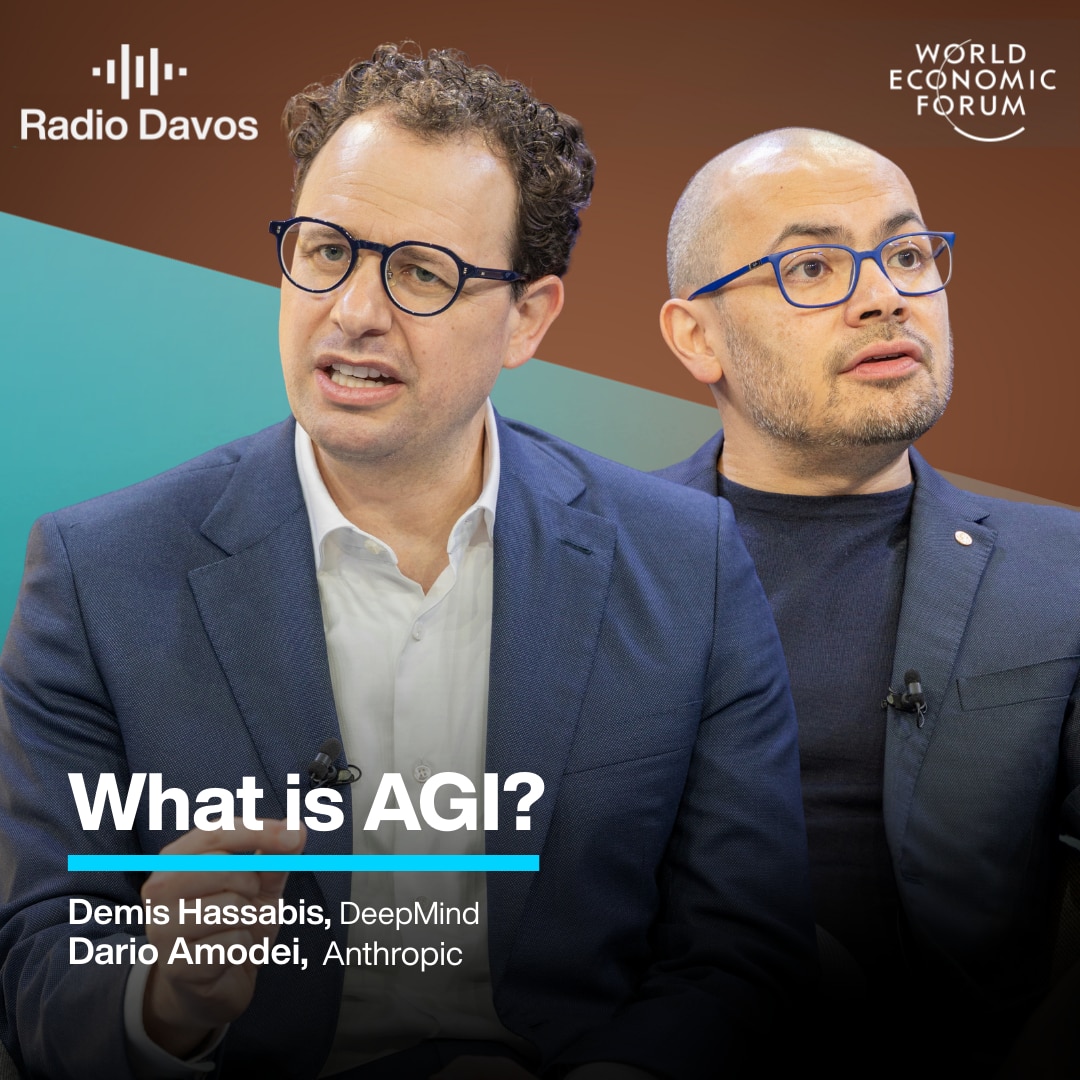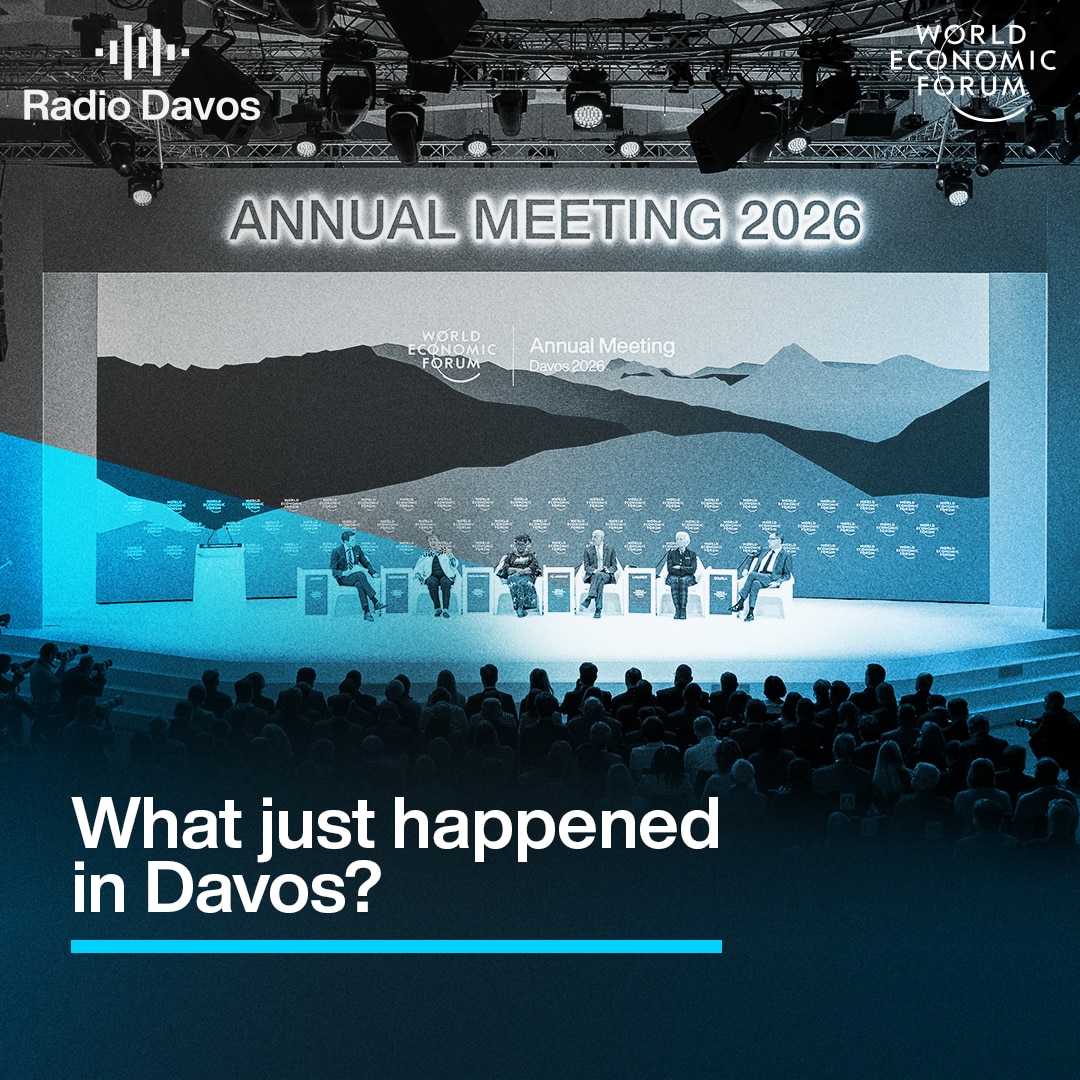What are the 'positive tipping points' that could help us accelerate out of climate disaster?
Transcripción del podcast
Tim Lenton, Climate Change Professor, University of Exeter: Climate doom - that's disempowering and just leaves us paralysed by fear, but also by the complexity of the situation.
Robin Pomeroy, host, Radio Davos: Welcome to Radio Davos, the podcast from the World Economic Forum that looks at the biggest challenges and how we might solve them. This week: what’s the antidote to climate doomerism, the feeling that nothing can prevent climate catastrophe so nothing’s worth trying? This climate scientist is one of many who insist there are positive tipping points.
Tim Lenton: Whilst it may not look like we're progressing very fast, if you understand the laws of exponential change and doubling and doubling and doubling and doubling of action, we do really have a chance to accelerate out of trouble.
Robin Pomeroy: The rise in renewable power, in electric vehicles, and things like green hydrogen and green ammonia will have ripple effects throughout economies and supply chains around the world. Professor Tim Lenton tells us about the ‘super leverage points’ that could change the game.
Tim Lenton: So it's a cascade of tipping points across sectors, all starting with what I call a super leverage point.
Robin Pomeroy: And, Prof Lenton says, no, we are not powerless.
Tim Lenton: We all have what we call agency in this situation, and that should be empowering for us.
Robin Pomeroy: Subscribe to Radio Davos wherever you get your podcasts, or visit wef.ch/podcasts where you will also find our sister programmes, Meet the Leader and Agenda Dialogues.
I’m Robin Pomeroy at the World Economic Forum, and with this look at positive tipping points of climate change…
Tim Lenton: We need to go at least five times faster in decarbonising the economy. And the only credible way to do that now is through self-propelling exponential change, what I'm calling positive tipping points.
Robin Pomeroy: This is Radio Davos
Climate tipping points are the dangerous phenomena that could suddenly make climate change even worse than it is already - like jumping from the proverbial frying pan into the fire. Things like melting ice sheets that could change ocean currents, thawing permafrost that releases vast amounts of methane, or rainforests turning into dry savannah - events that could completely destabilise the global environment and would be hard or impossible to reverse.
But, according to a growing number of climate scientists, there is also the prospect of ‘positive tipping points’. Things that can happen to suddenly speed up the reduction in greenhouse gas emissions in ways that humanity has so far failed to achieve.
One of those is Tim Lenton, Professor of Climate Change and Earth System Science at the University of Exeter. As you will hear in the interview, other climate experts use terms such as 'social tipping points' or 'sensitive intervention points' - Professor Lenton says these are similar concepts that altogether should dispel the notion that we are doomed to inaction by the threat of climate change.
Tim Lenton spoke to my colleague Anna Bruce-Lockhart.
Tim Lenton: My name's Tim Lenton, and I'm a professor of climate change at the University of Exeter in the United Kingdom.
I've been working on the urgent need to find and trigger positive tipping points to accelerate action towards net zero greenhouse gas emissions in order to avoid some damaging and dangerous climate tipping points.
Anna Bruce-Lockhart: So why do you think it's so important to shift away from doomerism?
Tim Lenton: It's vital to shift away from a sense of climate doom because that's disempowering and just leaves us, I think, possibly paralysed by fear, but also by the complexity of the situation.
Instead, it's really important to know that we can work with the beautiful, complex systems of the earth, but also our societies and economy to accelerate the change we desperately need to avoid the worst of the climate and ecological crisis.
I feel firmly that it's extremely urgent that we accelerate action on climate change. But I also know that that's possible, and that gives me what I call plausible grounds for hope rather than naive optimism.
Anna Bruce-Lockhart: Is plausible grounds for hope, the same as informed optimism?
Tim Lenton: Perhaps it is. But really, as a scientist, if we're going to call it informed optimism, it's the informed that matters. There's real concrete data and evidence that the transition to renewable energy and to electric vehicles, for example, are accelerating exponentially and have become self-propelling. So even if we withdrew some of the subsidies, incentives and other mandates that started the tipping, you wouldn't be able to stop it now.
Anna Bruce-Lockhart: . So you've described yourself as having an inner optimism, in an article I read recently. What was the moment, the aha moment, when you were looking around and noticing that that something was happening in society and things are shifting?
Tim Lenton: Well, I have an inner optimism because I became a scientist, because I was captivated by the beauty of the natural world, and particularly trying to understand the Earth as a living complex system, but also societies and human affairs within that as equally rich, complex systems.
And I've always been studying how the Earth has gone through tipping points that sometimes made the world more habitable for us and sometimes challenged life. And it seemed very natural to look at society through exactly the same lens.
And as the evidence started to come in, certainly in the last five or so years of really fast uptake of new technologies, it was natural to me to try to go out there and explain that tackling the climate problem isn't linear, just as the problem itself isn't linear. And on tackling it, that's critical. It means whilst it may not look like we're progressing very fast, if you understand the laws of exponential change and doubling and doubling and doubling and doubling of action, we do really have a chance to accelerate out of trouble.
Anna Bruce-Lockhart: Were there any particular things that caught your imagination at first?
Tim Lenton: I'm from the UK and in our own sweet way, without anybody really noticing, we went from a situation in 2012 where 40% of the electricity we used was from burning coal to a situation say ten years later in 2020 to where it was down to one or 2%. Nobody noticed because they don't think about where they the electricity comes from when they switch the light on. But it's been a very effective and rapid transition triggered by a really modest price on carbon emissions, specifically targeted just to the power sector.
So that excited me. And I was equally captivated when I started to understand why Norway was at least eight years ahead of the rest of the world in tipping its marketplace completely to electric vehicles.
And that led me to dig deeper into why Norway and how all that started. And that is an exciting tale of that begins with social activists, environmentalists, who ultimately persuade or, you might say, shame the government into action. And then that intersects with an evolving technology and a global marketplace and manufacturing companies. And it all comes together ultimately, and this extraordinary exponential change.
Anna Bruce-Lockhart: So can we go to some of the examples, then? Which sectors are the most exciting tipping points in?
Tim Lenton: We see compelling evidence that the power sector, so electricity generation passed a tipping point where renewable energy, solar or wind power, is the cheapest form of power generation now in most of the world. And the uptake of solar and wind power is exponential in terms of the amount deployed, doubling pretty much every year or two.
The next key sector, after renewable energy in the electricity supply, is cars, what we call sort of light road transport, more broadly. They are showing clear signs, electric vehicles of the the number of them and the market share of them rising exponentially, doubling roughly every year or a year and a half.
And in some countries, the market's already completely tipped to EVs. That's notably Norway. But even the global marketplace, which is on about, in 2022, a 10% market share for full battery electric vehicles. That had pretty much doubled from the year before and the year before that. And that will tell you immediately that if it doubles to 20% and then to 40%, it'll only be a few years time, before 2030, I think, the market will be dominated by EVs.
Anna Bruce-Lockhart: And what are 'super-leveraged tipping points'?
Tim Lenton: So having mentioned how there are tipping points in power generation and then transport, the next important thing to grasp is that those sectors of the economy as they're called, interact.
So the fact that renewable energy is becoming cheaper than any source of electricity ever has been is a big incentive to electrify a transport which is getting cheaper all the time.
A massive tipping point to electric vehicles means that batteries are getting cheaper and cheaper and cheaper the more that get built through something called economies of scale, that's crucial for reinforcing the transition to renewable energy. Because as we push towards 100% renewable electricity, we have to match electricity supply and demand.
When you put on the kettle isn't always when the sun is shining or the wind's blowing. So we need cheap storage of electricity and cheap batteries is a really key form of that.
So these two tipping points are reinforcing each other, and that's just one example of how things couple across sectors in reinforcing ways. And that introduces the idea that you can come up as somebody in policy making with policies that aren't just designed to tip one sector, you know that they will have an impact across other sectors.
And that's where I came up with the idea of what we're calling a 'super-leverage point', a point you can intervene in the economy not just to change one bit of the economy, but to change to create change that will spread across the economy to other sectors.
Anna Bruce-Lockhart: It would be really interesting to know what examples you would like to share of super-leverage tipping points.
Tim Lenton: So having just explained that cars-power connection, a good super leverage point is if more countries adopt what are called zero emission vehicles mandates, in simplest form bans on petrol and diesel car sales beyond a certain point in the future. And already China and the EU have set that date at 2035.
That's a powerful policy to bring forward all the reinforcing feedbacks that lower the price and improve the quality of electric vehicles. But by producing cheaper batteries quicker, it will also help accelerate the transition of the power sector to 100% renewables. And it will help heavy goods transport and medium and lightweight goods transport to also electrify. So we'll get a cross-sector effect.
So you might well be asking, well, what's the next sector to tip.
Green ammonia is ammonia that we manufacture by putting together nitrogen that we've separated from the air with hydrogen that crucially, we've separated from the water molecule using renewable electricity in a process called electrolysis. So that's a source of ammonia that can be zero carbon. And ammonia is crucial for fertiliser, but it also offers potential as an energy carrier and as a fuel, for example, for big ships in the ocean.
Why is there a super-leverage point there? Well, because there's a first market for green ammonia, and that happens to be the fertiliser, because the price of fossil fuel fertiliser is sky high ever since the war in Ukraine. But once you open up a market for, in this case a new material, you begin to bring down its price by triggering reinforcing feedbacks that we talk about as learning by doing - the more green ammonia manufacturing plants we make, the better we get at making them. But also what we call economies of scale, the more manufacturing plants we make and the larger we make them, the cheaper the next one's going to get to make.
All of these things will bring down the price of both green ammonia and what we'd call green hydrogen - hydrogen split from water with renewable energy.
Bring down the price of those things to the point where green ammonia can then be cost-competitive as a shipping fuel. And that's another huge market. So we'll then scale up ammonia production even further, bring down the price of green ammonia and green hydrogen yet further, and then it becomes cost competitive for an even bigger market, which is to use green hydrogen to reduce the metal iron to make steel in a clean net zero steel production.
So it's a cascade of what we might call tipping points across sectors, all starting with what I call a super leverage point to incentivise green ammonia production, which we might do by encouraging governments to have a mandate to include a certain amount of green ammonia in the fertiliser that's used in their country or in their marketplace.
Anna Bruce-Lockhart: And what about plant based proteins?
Tim Lenton: Plant based proteins are an extraordinary opportunity space for reducing our impact on the land, as well as reducing greenhouse gas emissions from the food system and giving back land, if you like, to regrow forests, which might take carbon from the atmosphere and so on and so forth.
There's a really disproportionate impact here because eating meat, in particular eating beef or drinking milk or eating cheese, is a spectacularly inefficient way to use the Earth's land surface. So that, along with other livestock products, if they can be substituted with alternative proteins that frankly taste just as good now and are competitive in price and rapidly becoming cheaper, then we open up a huge gain both in greenhouse gases and in renewing biodiversity.
There's a leverage point here in the sense that, well, you could have again, government mandating, for example, why aren't we mandating that hospitals procure alternative proteins for hospital food? Because after all, we know that eating meat, especially red meat, is bad for your health. That would create a market for alternative proteins, which would help them achieve economies of scale, lower price and so on. But it will have these benefits of not just the direct effect on the food system, but, as I've hinted, opening up this opportunity space for nature based solutions to, if you like, recolonise large areas of the land surface and suck greenhouse gases, especially carbon, out of the atmosphere.
Anna Bruce-Lockhart: In all of these tipping points there are certain factors that help turn what might just be classed as a trend into something that might eventually become a tipping point. What would you say that the main factors are in terms of the likelihood of the public adopting practices that help move society towards a tipping point?
Tim Lenton: So the crucial idea here behind the tipping point is it's when a reinforcing or an amplifying feedback within a system gets so strong that it just keeps propelling change without you having to push the system anymore.
And then we've got to ask, okay, what are those reinforcing feedbacks? And some of those are things like the more we consume a product, the better the people in manufacturing get at making it, because there's all this learning going on all the time. And as consumers we might feedback, you might say this is rubbish, this is better, so on and so forth. Also, the more we consume a product, the more manufacturers are going to want to make of that product and they've got to find ways of bringing down, they're going to achieve reductions in price of that product by scaling it up.
So that was a an answer that says that we're all consumers, so we're all just as consumers playing some behind the feedbacks. It goes beyond that. Just as a member, just as a citizen, I'm probably not alone in having a pension and I can ask questions about where my pension is invested and I can I can complain as a pension holder if I don't like where my pension invested. And there's an awful lot of capital in pension funds worldwide that, some of it, is still working against the transition we need and still propping up fossil fuel companies when I would rather it supported the transition and it might be that my pension was invested in all the things we talked about: renewable energy, electrifying transport, alternative proteins. So I've got some leverage there.
I might also choose to be a social activist as a citizen and go out on the streets or make my voice heard, as a professor writing an op-ed in a newspaper to try to explain this thinking and encourage change.
What I'm getting at is, well, we all have what we call agency in this situation, and that should be empowering for us in the face of a climate crisis that's otherwise rather disempowering and depressing.
Anna Bruce-Lockhart: I wanted to touch on the research of Potsdam and Oxford as well. And they seem to be moving towards similar thing. Johan Rockström [Director of the Potsdam Institute for Climate Impact Research] calls it the social tipping point. And Oxford the sensitive intervention points. Is this a tipping point of its own? Leading private scientists coalescing around the same idea?
Tim Lenton: I think it is a tipping point if the kind of climate research community, somewhat independently, somewhat talking to each other, all start pumping out the same core idea that there is nonlinear dynamics, as we call it, in the economy, just like there is in the climate. And actually on the economy side, that's that could be our salvation. Whereas in the climate it was one of the biggest sources of trouble.
So I'm excited when I see my friends, colleagues, different groups also putting out this idea. And whatever language each of us chooses to use is fine. Ultimately, we might settle on a common language for what we're talking about, and that might help just spread the word to the general public and to policymakers. But as a scientist, the crucial thing is the concepts and the understanding and the systems thinking here. And that's what a bunch of us and different groups are trying to get across.
Anna Bruce-Lockhart: What is the ultimate vision? What change are you tryimg to effect and what do you hope to see after people have read and digested your research, and what impact do you want it to have?
Tim Lenton: Well, it's absolutely clear to me as a climate scientist that we have to stop fossil fuel burning as soon as we can and limit what are called the cumulative emissions of greenhouse gases.
It's also absolutely clear that we're going nowhere near fast enough at doing that. We need to go at least five times faster in decarbonising the economy. And the only credible way to do that now is through self-propelling exponential change, what I'm calling positive tipping points.
So the whole motivation to be researching those, to be researching what can trigger them sooner, is to avoid what I call the climate tipping points that are otherwise a source of existential risk to me, my kids, your kids, your grandkids, and all the generations to come.
Robin Pomeroy: Tim Lenton is Professor of Climate Change and Earth System Science at the University of Exeter.
The World Economic Forum is working with industry to help decarbonize the world’s heavy-emitting sectors. The First Movers Coalition (FMC) has almost 100 member companies that have made commitments to purchase near-zero emission products and services made with breakthrough technology - amounting to the world's largest private sector demand signal for emerging climate technologies.
We’ll be reporting on the progress the First Movers Coalition has made in a later episode of Radio Davos. You can also listen back to previous episodes where we have discussed this very important initiative. You can also find more information at the website wef.ch/fmc.
Please subscribe to Radio Davos wherever you get your podcasts and if you enjoyed what you heard today, it would really help if you could give us a rating or even a review. And join the conversation on the World Economic Forum Podcast club on Facebook.
This episode of Radio Davos was written and presented by me, Robin Pomeroy, with reporting by Anna Bruce-Lockhart and studio production by Taz Kelleher.
We will be back next week, but for now thanks to you for listening and goodbye.
Scroll down for full podcast transcript - click the ‘Show more’ arrow
Climate 'tipping points' are the dangerous phenomena that could suddenly make climate change even worse than it is already: melting ice sheets that could change ocean currents, thawing permafrost that releases vast amounts of methane, or rainforests turning into dry savannah - events that could completely destabilise the global environment and would be hard or impossible to reverse.
But, according to a growing number of climate scientists, there is also the prospect of ‘positive tipping points’. Things that can happen to speed up the reduction in greenhouse gas emissions in ways that humanity has so far failed to achieve.
One of those is Tim Lenton, Professor of Climate Change and Earth System Science at the University of Exeter. As you will hear in the interview, other climate experts use terms such as 'social tipping points' or 'sensitive intervention points' - Professor Lenton says these are similar concepts that altogether should dispel the notion that we are doomed by climate change.
Links:
First Movers Coalition: wef.ch/fmc
Tim Lenton at the University of Exeter: https://geography.exeter.ac.uk/people/profile/?web_id=timothy_lenton
Related Podcasts:
Related videos:
Check out all our podcasts on wef.ch/podcasts:
Alojado por:
Más episodios:
La Agenda Semanal
Una actualización semanal de los temas más importantes de la agenda global





